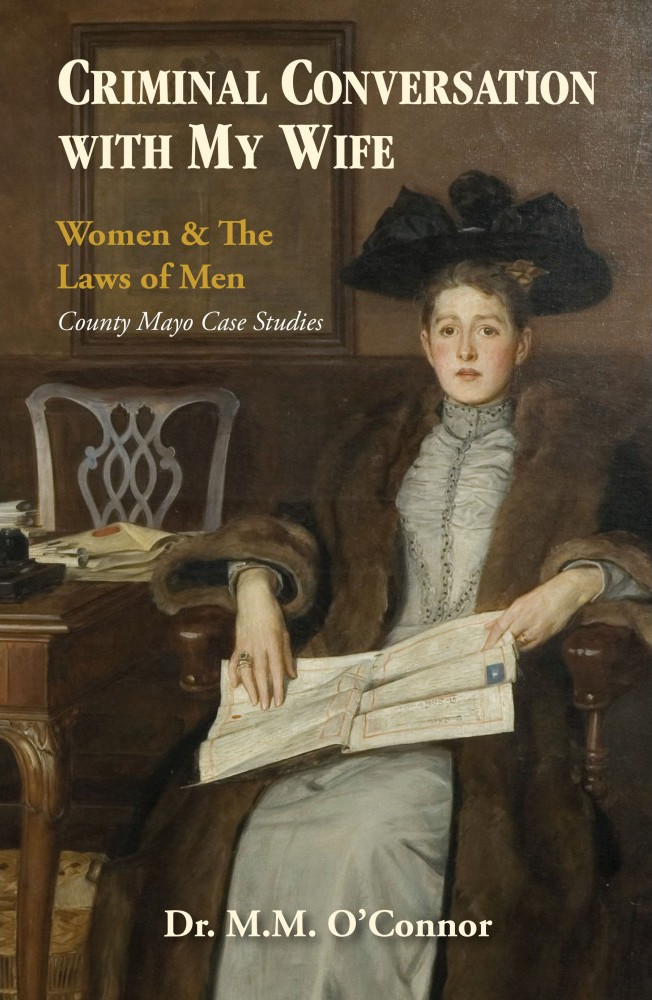Our Legal Heritage: Criminal conversation and men’s laws about women

In spring 1928, the Ballina Circuit Court awarded damages of £200 with costs and expenses to Mr Patrick Joseph Cunningham for the loss of services of his daughter, Bridie, who had been seduced by Mr John Horan at a farewell party for a local girl who was leaving for America.
That case from less than 100 years ago is an example of the many inequalities between men and women in law at the time. Dr Michael O’Connor, a graduate of Trinity College Dublin and Cambridge University, noted that some laws at the time highlighted that “women were the losers when we gained independence”.
In his new book Criminal Conversation With My Wife, Dr O’Connor examines the history of Mayo women and the laws of men. He has included a chapter about the law of criminal conversation, which gave a man a right of action for damages against someone who engaged in sexual activity with his wife. The law was only repealed in 1981.
Dr O’Connor focusses on case studies from County Mayo in the book partly because “when Mayo people did criminal conversation, they did it with a big bang,” he said. “I just collected a whole series of stories of these women that I felt needed to be told — they show what Ireland was like.”
The law of criminal conversation regarded women as chattels and entitled a man to compensation based on the value of his wife. A woman’s value was determined by considering her role in the husband’s home or business as well as her qualities as a wife and, if applicable, as a mother. Dr O’Connor noted that it was “bizarre” that a husband was seeking damages for another person engaging in sexual activity with his wife yet trying to show how valuable the wife was at the same time.
Criminal conversation cases were uncommon but “attracted a lot of attention” when they came before the courts, according to Dr O’Connor. One such case was that of Joynt v Jackson in 1880.
Charlotte Baker Sorsby was the wife of the plaintiff, Richard Watson Joynt, who was editor of the Ballina Herald newspaper. Ms Sorsby had sexual relations with nine other men around Ballina over a number of years. Several had taken advantage of her and one even raped her at knifepoint. However, the court expressed little sympathy for her in this regard. Dr O’Connor quotes the presiding judge, Justice Dowse, who said in summarising the case that Sorsby admitted a “sufficient number of improper acts to damn any woman”.
The case before the court concerned a long-term affair Ms Sorsby had with the defendant, Mr James Jackson, who was the manager of the Bank of Ireland branch in the town. Dr O’Connor said the Joynt case was “highly scandalous” and attracted a lot of interest because it involved “the wealthy middle class”. The plaintiff, Mr Joynt, had himself engaged in sexual activity with four other women in Ballina. “That sold newspapers,” Dr O’Connor noted.
Normally, a wife had no entitlement to be heard or to call a witness to speak for her in a case of criminal conversation. “Her name was before the court but she was not,” according to Dr O’Connor. However, in Joynt, Ms Sorsby’s father told her to give evidence in support of her husband. She did so, which even the judge regarded as highly unusual.
A jury ultimately awarded £1,000 in damages to the plaintiff, Mr Joynt, but he never received the money from Mr Jackson. “There are no winners in this course of action but the loser is undoubtedly the woman,” Dr O’Connor said.
Criminal conversation was not abolished in Ireland until the Family Law Act 1981. Dr O’Connor emphasised that even around that time, there were TDs “coming forward and seeking to justify it and caution against doing things quickly.” He observed that one reason for this may be because “it’s always when it comes to issues that matter for women, children and people who are seen as being different that things take time… If it’s something the patriarchy needs, it’s done tomorrow.”
While some sought to delay or stop the repeal of the law of criminal conversation, some TDs strongly advocated for repealing the law. One such TD was Eileen Desmond, who told the Dáil at the time that the law “has been extremely offensive to the dignity of women as persons”.
Dr O’Connor concluded that it is important to learn about criminal conversation and “acknowledge it as part of our history”. He said: “It has to inform debates we have about, for example, domestic violence [and] women in the Constitution.”
His conclusion is particularly relevant following the announcement earlier this week that a referendum on whether to remove the constitutional reference to a woman’s place in the home will take place on the 8 March 2024, which will also be International Women’s Day.











